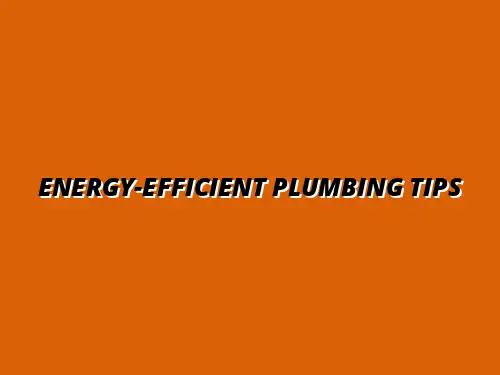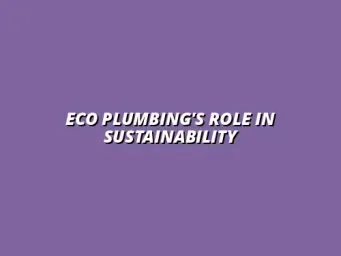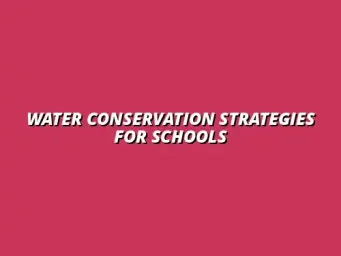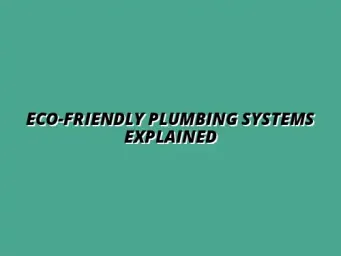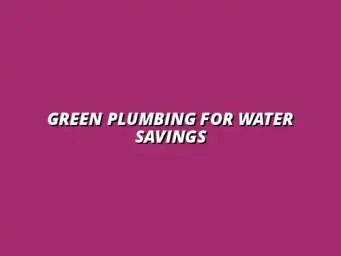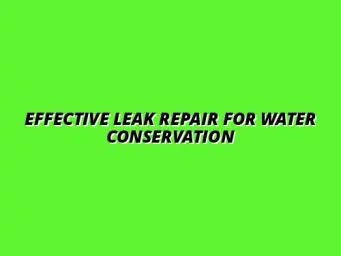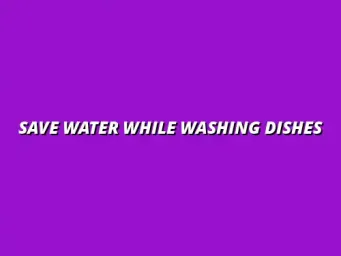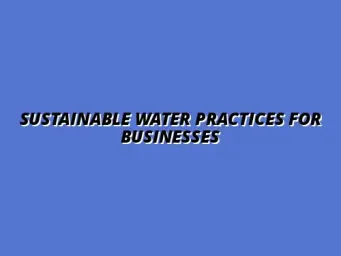Understanding Energy Efficiency in Plumbing Systems
When we talk about *energy efficiency in plumbing systems*, we're discussing how effectively a plumbing system uses energy while minimizing waste. This goes beyond just saving water; it involves optimizing energy use throughout the entire plumbing setup. By adopting energy-efficient practices, homeowners can significantly reduce both their environmental impact and their utility bills.
Energy efficiency in plumbing is essential for sustainable living. It ensures that resources are used responsibly, keeping costs down and contributing positively to the environment. In this section, we’ll explore what energy efficiency means specifically for plumbing, its importance, and the key components of an energy-efficient system. Learn more about the benefits of eco-friendly plumbing for your home.
Defining Energy Efficiency in Plumbing
What does energy efficiency mean for plumbing? Essentially, it refers to the ability of plumbing systems to deliver hot and cold water while using the least amount of energy possible. This can be achieved through proper system design, high-efficiency appliances, and regular maintenance. An energy-efficient plumbing system conserves water and reduces energy costs, offering long-term savings to homeowners.
Moreover, understanding energy efficiency can help you make informed decisions about upgrades and replacements. By focusing on energy efficiency, we can ensure our plumbing systems work smarter, not harder, which is crucial in today’s world.
What Does Energy Efficiency Mean for Plumbing?
Energy efficiency in plumbing is about more than just low utility bills; it also involves environmental stewardship. It means utilizing resources wisely, ensuring that every drop of water and every unit of energy is used effectively. The goal is to create a plumbing system that meets your needs without unnecessary waste. Discover simple water-saving tips for your home to further enhance efficiency.
Key components of energy efficiency in plumbing include:
- High-efficiency water heaters
- Proper insulation of pipes
- Low-flow fixtures
- Regular maintenance and inspections
Importance of Energy Efficiency in Home Plumbing
The importance of energy efficiency in home plumbing cannot be overstated. Efficient plumbing systems can lead to significant cost savings and contribute to a healthier planet. By reducing energy consumption, we decrease our carbon footprint, making a positive impact on the environment.
Additionally, energy-efficient plumbing systems can enhance the comfort of your home. For example, they provide better temperature control and consistent water pressure, making daily activities more enjoyable. Ultimately, investing in energy efficiency pays off in multiple ways, from lower bills to improved quality of life. Regular maintenance is key to optimal performance; find out more about maintaining your water heater efficiently.
Key Components of an Energy-Efficient Plumbing System
To build an energy-efficient plumbing system, several key components come into play. Understanding these elements can help you make the best choices for your home. Each component contributes to the overall efficiency of the plumbing system and can lead to significant long-term savings.
In the following sections, we will explore essential components like water heaters and pipes, and how their efficiency ratings impact your home energy use. From choosing the right appliances to optimizing your plumbing layout, every choice counts in creating an energy-efficient plumbing system.
Water Heaters and Their Efficiency Ratings
Water heaters are one of the largest energy consumers in a home. Understanding their efficiency ratings can guide you in selecting the most suitable option. When shopping for a water heater, consider the following types:
- Tankless water heaters
- Heat pump water heaters
- Solar water heaters
- Traditional storage water heaters
Each type has varying efficiency levels, and your choice should depend on your specific household needs and energy consumption patterns. It’s essential to look for models with high Energy Factor (EF) ratings, which indicate better energy efficiency.
Choosing the Right Water Heater for Energy Savings
Selecting the right water heater can lead to substantial energy savings. When choosing a model, consider factors such as:
- Size and capacity based on your household demand
- Energy source (gas, electric, solar)
- Installation space and requirements
- Cost of operation and maintenance
The right choice can reduce your energy bills and ensure you have hot water when needed. It's worth taking the time to research and compare options.
Maintenance Tips for Optimal Water Heater Performance
To keep your water heater running efficiently, regular maintenance is key. Here are a few maintenance tips:
- Flush the tank annually to remove sediment build-up.
- Check the anode rod every three years and replace it if necessary.
- Insulate the water heater and hot water pipes to minimize heat loss.
- Set the temperature to 120°F to save energy and prevent scalding.
By following these tips, you can enhance the performance and longevity of your water heater while enjoying energy savings! For more comprehensive maintenance advice, check out our guide on maintaining your plumbing system efficiently.
Pipes and Insulation for Reduced Energy Loss
The type of pipes used in plumbing can significantly affect energy efficiency. Choosing the right materials and ensuring proper insulation helps minimize energy loss throughout your home. Common pipe materials include:
- PEX (cross-linked polyethylene)
- Copper
- CPVC (chlorinated polyvinyl chloride)
- Galvanized steel
Each material has its own advantages and disadvantages in terms of energy efficiency, cost, and durability. It's essential to evaluate your options when planning your plumbing system.
Insulation Techniques to Minimize Heat Loss
Proper insulation of pipes is crucial for reducing heat loss as hot water travels through the system. Here are some effective insulation techniques:
- Wrap pipes in foam insulation sleeves.
- Use insulated pipe tape for joints and connections.
- Insulate hot water tanks with blankets designed for that purpose.
Implementing these techniques can lead to noticeable energy savings and improve the overall efficiency of your plumbing system.
Fixture Selection and Water Usage
Choosing the right fixtures is another important factor in achieving an energy-efficient plumbing system. Low-flow fixtures can dramatically reduce water consumption without sacrificing performance. Some common low-flow options include:
- Low-flow showerheads
- Water-efficient faucets
- Dual-flush toilets
By installing these fixtures, you can conserve water and save on your water bill, while also contributing to energy efficiency. For specific tips on reducing water waste, see our article on daily tips to reduce water waste.
Low-Flow Fixtures: A Pathway to Energy Savings
Low-flow fixtures are specially designed to reduce water flow while maintaining adequate pressure. They help in conserving water, which in turn reduces the energy needed to heat that water. The benefits of using low-flow fixtures include:
- Lower utility bills
- Environmental conservation
- Improved plumbing efficiency
Incorporating low-flow fixtures into your home is a simple yet effective way to enhance energy efficiency!
Understanding the Impact of Fixture Choices on Water Consumption
The choices you make regarding plumbing fixtures have a direct impact on water consumption. Fixtures that are not water-efficient can lead to waste, which affects both your bills and the environment. By understanding the flow rates and efficiency ratings of different fixtures, you can make informed decisions that benefit your household and the planet. Learn more about essential bathroom plumbing maintenance to ensure optimal efficiency.
Ultimately, selecting energy-efficient fixtures is a smart move toward creating a more sustainable home. Every drop saved contributes to a larger goal of conserving our precious resources.
Addressing Common Questions about Plumbing Energy Efficiency
How Much Can You Save with an Energy-Efficient Plumbing System?
Many people wonder about the actual savings they can achieve through an energy-efficient plumbing system. The truth is, the amount you save may vary, but studies suggest that homeowners can see reductions of up to 30% on their utility bills. This can lead to significant annual savings, especially in areas with high energy costs.
When estimating potential savings, consider factors such as the age of your plumbing system, the types of fixtures installed, and your overall water usage. For instance, if you are currently using outdated fixtures and water heaters, switching to energy-efficient models can drastically reduce your expenses over time.
- Evaluate your current energy bills.
- Calculate potential savings from new installations.
- Factor in local energy costs and usage patterns.
Estimating Cost Savings from Improved Efficiency
Estimating cost savings from improved efficiency can help you make informed decisions. By analyzing your current water and energy usage, you can project how much you might save after upgrading to more efficient systems. For instance, switching to a high-efficiency water heater can save you around $200 to $400 per year depending on local energy rates.
Additionally, keep in mind that the savings from energy-efficient plumbing can accumulate over time, leading to even greater benefits. It's essential to track your energy bills regularly to see how these changes impact your overall costs.
Factors That Influence Savings on Your Utility Bills
Several factors can influence how much you save with an energy-efficient plumbing system. Key elements include:
- The efficiency rating of appliances & fixtures.
- Your household's water usage habits.
- Local utility rates and environmental conditions.
By understanding these factors, you can identify the best strategies for maximizing your savings. Small changes in your water usage habits can complement your new energy-efficient installations, leading to even greater reductions in your monthly bills.
What Are the Signs of an Inefficient Plumbing System?
Spotting an inefficient plumbing system can save you money and frustration in the long run. Some common signs include high water bills, inconsistent water temperature, and visible leaks. If you notice any of these indicators, it’s time to assess your plumbing setup.
Another crucial sign is strange noises coming from your pipes or fixtures. These sounds can indicate issues such as water hammer or sediment buildup in your water heater, both of which can lead to inefficiencies. Addressing these problems promptly can prevent further damage and improve energy savings. For assistance with plumbing issues in Great Barr, Birmingham, consider contacting a local plumber.
Identifying Red Flags in Your Plumbing Setup
Knowing what to look for can help you identify red flags in your plumbing system:
- Frequent leaks or drips.
- Low water pressure or inconsistent flow.
- Water heater working harder than usual.
By keeping an eye out for these signs, you can take action before they lead to more significant problems. Regular inspections can help you catch these inefficiencies and address them proactively.
Common Problems That Impact Energy Efficiency
Several common problems can severely impact the energy efficiency of your plumbing system. These include:
- Old, inefficient water heaters.
- Pipes that are not insulated.
- Leaky fixtures and outdated appliances.
Each of these issues not only wastes water but also increases your energy bills. Identifying and addressing these problems should be a priority for any homeowner looking to enhance their plumbing system's efficiency.
Exploring Incentives and Rebates for Energy-Efficient Upgrades
Government Programs Supporting Plumbing Efficiency
Many homeowners are not aware of the various government programs available to support plumbing efficiency upgrades. These programs often include financial incentives, such as rebates or tax credits, to encourage energy-saving modifications in homes.
Incentives can vary greatly depending on your location, so it’s essential to research what’s available in your area. Participating in these programs can significantly offset the costs associated with upgrading your plumbing systems.
Understanding Local Incentives for Homeowners
Local governments often have specific incentives for homeowners looking to improve their plumbing efficiency. Some common incentives include:
- Cash rebates for purchasing energy-efficient appliances.
- Low-interest loans for major plumbing renovations.
- Tax credits for energy-saving home improvements.
Taking advantage of these local programs can make the transition to an energy-efficient plumbing system more affordable. Make sure to check with your municipality for the latest information on available incentives.
How to Apply for Energy Efficiency Rebates
Applying for energy efficiency rebates typically involves a few key steps. First, research the available programs in your area and determine which ones you qualify for. From there, gather the necessary documentation, such as receipts and proof of purchase.
Next, fill out the application forms carefully and submit them as instructed. It's always a good idea to follow up to ensure your application is processed quickly. By making the effort to apply, you can unlock valuable savings!
Working with Professionals for Energy-Efficient Solutions
When looking to enhance your plumbing system, working with professionals who specialize in energy efficiency is crucial. These experts can provide valuable insights and suggest upgrades tailored to your specific needs. They can help you make informed decisions about which products and practices will yield the best results.
Finding qualified plumbers who understand the importance of energy efficiency can be a game-changer. They can guide you in choosing the right fixtures and systems that align with your energy-saving goals.
Finding Qualified Plumbers Specializing in Energy Efficiency
To find qualified plumbers who specialize in energy efficiency, consider the following steps:
- Ask for referrals from friends or family.
- Check online reviews and ratings.
- Look for plumbing companies with certifications in energy-efficient technologies.
Doing your due diligence will ensure you work with professionals who are knowledgeable and can offer you the best solutions for your plumbing needs.
Questions to Ask Your Plumbing Professional About Energy Efficiency
When meeting with a plumbing professional, it’s essential to ask the right questions. Here are some examples:
- What energy-efficient options do you recommend?
- How can we optimize our current plumbing system?
- What incentives are available for the upgrades you suggest?
These questions can help you understand your options better and ensure that you’re making informed decisions to improve your plumbing's energy efficiency.
Summarizing the Path to an Energy-Efficient Plumbing System
Recapping the Benefits of Enhancing Your Plumbing System
Enhancing your plumbing system for energy efficiency offers numerous benefits. From saving money on utility bills to reducing your environmental footprint, these upgrades can make a significant impact. Not only will you enjoy lower costs, but you will also contribute to a sustainable future by using fewer resources.
Additionally, an energy-efficient plumbing system often leads to improved comfort within your home. You’ll experience consistent water temperatures and better pressure, making your daily routines more enjoyable. Remember to incorporate daily tips to reduce water waste for optimal results.
Long-term Advantages of Energy Efficiency
The long-term advantages of energy efficiency extend beyond just immediate savings. An energy-efficient plumbing system often leads to:
- Increased property value.
- Longer lifespan for plumbing fixtures and appliances.
- Less frequent repairs and maintenance.
Investing in energy efficiency today can lead to a more reliable and cost-effective plumbing system in the future, ultimately making it a wise decision for any homeowner.
Incorporating Energy-Efficient Practices into Daily Life
Finally, incorporating energy-efficient practices into your daily life can make a big difference. Simple actions like turning off the tap while brushing your teeth or taking shorter showers can significantly reduce water consumption. Additionally, regularly checking for leaks can help maintain your system's efficiency.
By adopting these practices, you can enjoy the benefits of an energy-efficient plumbing system while actively contributing to a greener planet!

